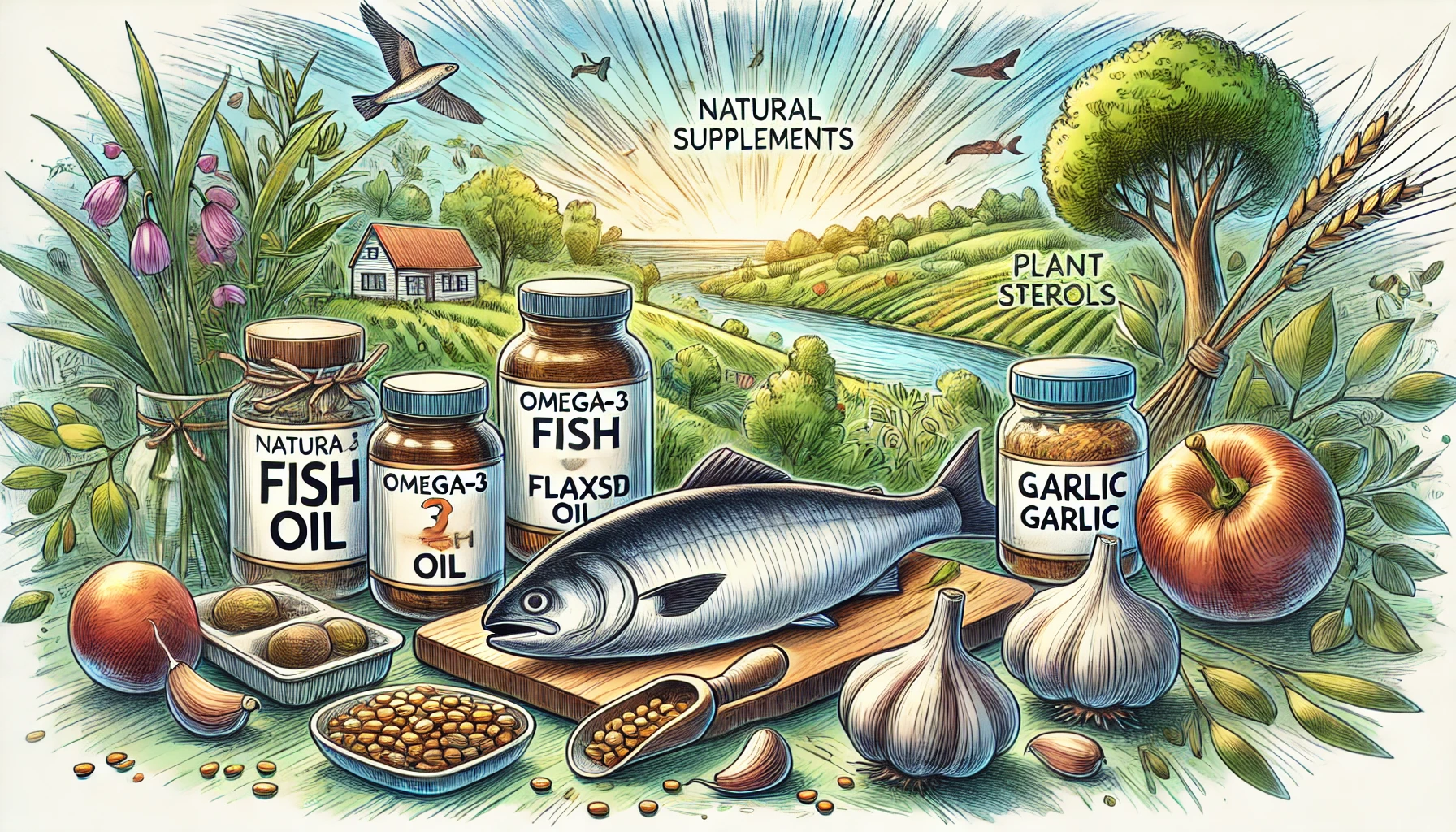Managing cholesterol levels is crucial for maintaining heart health and preventing cardiovascular diseases. While lifestyle changes and medications are common strategies, natural supplements can also play a significant role in lowering cholesterol. These supplements, often derived from plants and other natural sources, can help reduce bad cholesterol (LDL) and improve good cholesterol (HDL).
In this blog, we will explore natural supplements that help lower cholesterol. We will cover ten main points, each detailing a specific supplement, its benefits, and how to incorporate it into your routine. By understanding these natural options, you can make informed decisions to support your cholesterol management plan.
1. Omega-3 Fatty Acids
- Source: Found in fish oil, flaxseeds, chia seeds, and walnuts.
- Benefits: Omega-3 fatty acids help lower triglycerides, reduce inflammation, and raise HDL cholesterol levels.
- Dosage: Aim for 1,000-2,000 mg of EPA and DHA (the active forms of omega-3) daily, either through supplements or by eating fatty fish like salmon and mackerel twice a week.
- Supplement Form: Fish oil supplements are widely available and can be taken with meals to reduce any potential fishy aftertaste.
- Safety: Generally safe, but consult your healthcare provider if you are on blood-thinning medications.
2. Plant Sterols and Stanols
- Source: Naturally found in fruits, vegetables, nuts, and seeds; also available as fortified foods and supplements.
- Benefits: Plant sterols and stanols help block the absorption of cholesterol in the intestines, effectively lowering LDL cholesterol levels.
- Dosage: Consuming 2-3 grams of plant sterols or stanols daily can reduce LDL cholesterol by 10-15%.
- Foods: Look for fortified products like margarine spreads, orange juice, and cereals.
- Supplement Form: Available as capsules or tablets for those who prefer not to consume fortified foods.
3. Soluble Fiber
- Source: Found in oats, barley, beans, lentils, fruits (like apples and pears), and vegetables.
- Benefits: Soluble fiber binds to cholesterol in the digestive system, helping to remove it from the body and lower LDL levels.
- Dosage: Aim for at least 5-10 grams of soluble fiber per day to help lower cholesterol.
- Supplement Form: Psyllium husk is a popular fiber supplement that can be mixed with water or juice.
- Incorporation: Add fiber-rich foods to your diet, and consider supplements if needed to meet your daily intake goals.
4. Red Yeast Rice
- Source: A traditional Chinese food made by fermenting rice with a specific type of yeast (Monascus purpureus).
- Benefits: Contains monacolin K, a compound similar to the cholesterol-lowering drug lovastatin, which helps lower LDL cholesterol.
- Dosage: Typically, 1,200-2,400 mg of red yeast rice extract per day is recommended.
- Supplement Form: Available in capsule or tablet form.
- Caution: Consult your healthcare provider before using red yeast rice, especially if you are already on statin medications or have liver disease.
5. Niacin (Vitamin B3)
- Source: Found in foods like meat, fish, poultry, and whole grains; also available as a supplement.
- Benefits: Niacin helps raise HDL cholesterol and lower LDL cholesterol and triglycerides.
- Dosage: High doses (1,000-2,000 mg per day) are often required for cholesterol management, which should only be taken under medical supervision.
- Supplement Form: Available in immediate-release, sustained-release, and extended-release forms.
- Side Effects: Can cause flushing and liver toxicity at high doses, so it should be used with caution and under medical guidance.
6. Garlic
- Source: Fresh garlic cloves, garlic powder, and garlic extract supplements.
- Benefits: Garlic has been shown to modestly lower total and LDL cholesterol levels and improve overall heart health.
- Dosage: Consuming one to two cloves of fresh garlic daily or taking 600-1,200 mg of garlic extract supplements.
- Supplement Form: Available as capsules, tablets, and aged garlic extract.
- Incorporation: Add fresh garlic to your cooking or take supplements to achieve the desired intake.
7. Policosanol
- Source: Derived from the waxy coating of sugar cane, beeswax, and other plant sources.
- Benefits: Policosanol may help lower LDL cholesterol and raise HDL cholesterol levels.
- Dosage: Typical doses range from 5-20 mg per day.
- Supplement Form: Available in capsule and tablet forms.
- Effectiveness: While some studies show benefits, others are inconclusive; consult your healthcare provider before starting policosanol.
8. Green Tea Extract
- Source: Extracted from green tea leaves.
- Benefits: Contains catechins, antioxidants that help lower LDL cholesterol and improve overall cardiovascular health.
- Dosage: Drinking 2-3 cups of green tea daily or taking 300-400 mg of green tea extract supplements.
- Supplement Form: Available as capsules, tablets, and liquid extracts.
- Incorporation: Enjoy green tea as a beverage or take supplements to ensure adequate intake of catechins.
9. Artichoke Leaf Extract
- Source: Derived from the leaves of the artichoke plant.
- Benefits: Artichoke leaf extract can help lower total and LDL cholesterol by promoting bile production and excretion.
- Dosage: Typically, 500-1,000 mg of artichoke leaf extract per day is recommended.
- Supplement Form: Available as capsules and tablets.
- Usage: Take the extract before meals to help with cholesterol management.
10. Coenzyme Q10 (CoQ10)
- Source: Found naturally in small amounts in meat, fish, and whole grains; also available as a supplement.
- Benefits: CoQ10 helps reduce oxidative stress and may improve HDL cholesterol levels, particularly beneficial for those on statin medications.
- Dosage: Commonly recommended doses range from 100-200 mg per day.
- Supplement Form: Available in capsule and tablet forms.
- Combination: Often taken with statins to counteract potential CoQ10 depletion caused by the medication.
Incorporating these natural supplements into your daily routine can help manage cholesterol levels and support overall heart health. Always consult with your healthcare provider before starting any new supplement, especially if you are taking medications or have underlying health conditions. By combining natural supplements with a balanced diet and regular exercise, you can effectively control your cholesterol and improve your cardiovascular well-being.

